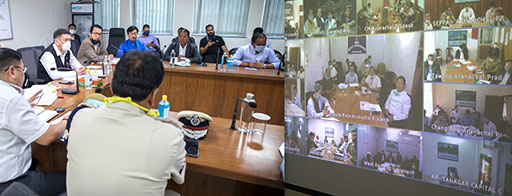Ban on issuing PAP, ILP to continue: CM
 ITANAGAR, May 2: With the Centre allowing stranded citizens to travel back to their home states, with conditions in place, Chief Minister Pema Khandu on Friday said the states’ nodal officers would coordinate and chalk out a detailed plan to bring back natives of Arunachal stranded outside.
ITANAGAR, May 2: With the Centre allowing stranded citizens to travel back to their home states, with conditions in place, Chief Minister Pema Khandu on Friday said the states’ nodal officers would coordinate and chalk out a detailed plan to bring back natives of Arunachal stranded outside.
Home Commissioner Kaling Tayeng will oversee the entire process as the chief nodal officer.
Informing that “in the first phase, people stranded in other northeastern states will be brought back in batches,” Khandu appealed to the Arunachalees stranded within the Northeast to apply online as directed till the midnight of 2 May.
“Thereafter, stranded citizens will be brought back in phased manner from other states, starting first with those in green zones,” he said during a videoconference with ministers, MLAs, deputy commissioners, police officers and health professionals of all the districts.
The chief minister, however, said that the ban in issuing protected area permits (PAP) and inner line permits (ILP) will continue to be in force.
“Applications for renewal of already existing permits will also be put on hold till a notification is issued in this regard by the home department,” he said.
Affirming that the state’s machinery is prepared to deal with the returning citizens, Khandu directed the DCs and the legislators, particularly of the districts bordering Assam, to personally visit all the quarantine centres near the entry points and make sure that they are fully equipped.
“Once these quarantine facilities start to house incoming Arunachalees, there should not be any complaints for lack of facilities like water supply, electricity, toilets, etc,” he said, and suggested forming local committees to monitor and oversee the quarantine centres.
Arunachal has 25 entry points with check gates along the boundaries with Assam. Of these, only 12 are functional since the lockdown as a precautionary measure.
“We need to learn to live with the novel virus. Therefore, securing the lives of our citizens after the lockdown ends and till a cure to this pandemic is found and made available will be the greatest challenge for us,” he said.
NESID, NEC funds to be used for developing health infrastructure
Advising waiting for directions from the Centre as the lockdown is yet to officially end, the CM said, “We must all dedicate our attention, energy and resources in hauling our health service infrastructure on a massive scale.”
Khandu informed the legislators that all funds that the state receives under the North East Special Infrastructure Development (NESID) and the North Eastern Council (NEC) schemes would be used solely for developing the state’s health infrastructure.
“Till last month, we had not a single ventilator kit or an ICU. This exposes the sorry state of affairs on our part. It must change,” he said.
Also informing that the government will initiate “a massive rationalization in transfer and posting of doctors,” Khandu urged the legislators, officers and others not to interfere or seek favours.
He directed Health Minister Alo Libang not to entertain any recommendation in the matter of transfer and posting of doctors.
Transportation issues discussed
Giving assurance that there are enough stocks of essential commodities in the state “to last for at least three months,” the CM suggested transporting essential commodities in advance to districts which are prone to road-blockades during the monsoon.
To several requests for facilitating to-and-fro travel between the eastern districts and the state capital, Khandu said that “the process has been initiated, now that interstate travel has been opened.”
He said the state transport department would work out the modalities in a day or two.
“The real challenge for us lies after 3 May. Let’s cooperate and coordinate as we have been doing the past two months and thwart entry of Covid-19 into our state,” he said.
The DCs updated the government on their districts’ status and preparedness to deal with Covid-19, while several legislators, including former chief minister Nabam Tuki and former speaker Wanglin Lowangdong, submitted suggestions for the way forward. (CM’s PR Cell)


